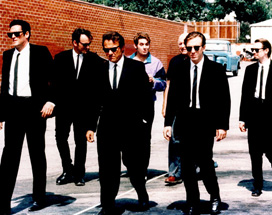Viking Night: Reservoir Dogs
By Bruce Hall
January 25, 2011
Now, if you already hate Quentin Tarantino, then don’t take my advice; you’ll just hate him even more. But if you’re as fascinated with him as I am – and if you love movies you should be - you will find that everything people adore and everything people despise about him is here in nascent form. And while Pulp Fiction is the movie that made Tarantino famous, Reservoir Dogs is the one that put him on the map. It provided a big boost to the careers of some tremendously deserving talent, it radically changed the landscape of independent cinema for the better and it simply, in my analysis, is a better film.
Where Pulp Fiction is a simple story dressed up in a glossy veneer, Reservoir Dogs is truly a character study, and a gritty, low-budget one at that. The film starts, as does its flashier descendant, with breakfast. Gruff mobster Joe Cabot (Lawrence Tierney) has decided to treat six of his henchmen to a delicious meal before hustling them off to carry out a jewel heist. Due to the sensitive nature of their criminal relationship, the men are all given code names. Mr. Brown (Tarantino) is in the midst of a dissertation on the true meaning of the Madonna song “Like a Virgin”. Meanwhile, Mr. Pink (Steve Buscemi) launches into a Marxist rant about the inequity of the proletariat wage scale. Seven mostly irrelevant minutes later, the film launches into the aftermath of the heist. Things have gone terribly wrong, resulting in Mr. Orange (Tim Roth) having been gravely wounded. Mr. White (Harvey Keitel) speeds toward the rendezvous point, doing his best to reassure and comfort his stricken comrade. The scene is surprisingly powerful, especially in light of the fact that we’ve yet to receive any meaningful background on these two characters. And this of course, is where Quentin Tarantino succeeds as often as he fails. It’s the dialogue that makes the scene work; no previous knowledge of the characters is necessary. Sadly, it’ll be a long time before the movie feels that genuine again.
Like Pulp Fiction, the story here is pretty thin – six thieves carry out a jewel heist, and things go badly due to an informant in their midst. Nobody knows the identity of the mole, but as they wait for each other to arrive at the drop site the pieces fall into place, and each anonymous hood finds out more about his partners than he bargained for. The ending is effective, but less surprising than it is just bloody and savage.
The problem is that Tarantino is less a storyteller than he is a guy with a lot of really cool but largely unrelated ideas and he wants them all on screen at once. Such as: “What if Madonna was really singing about penises?” Or: “Waitress is the number one field for female non college graduates.” or “Did you know what they call a Quarter Pounder with cheese in Amsterdam?” These are all interesting bits of trivia, and I don’t mean to suggest that they should be omitted from the script of either film. But instead of developing his characters through the natural ebb and flow of the story, Tarantino tends to rely too much on abstract narrative to provide depth instead.
Continued:
1
2
3
|
|
|
|




